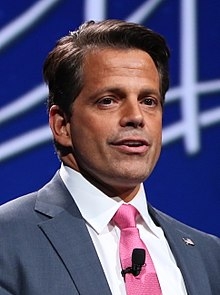You have /5 articles left.
Sign up for a free account or log in.

Anthony Scaramucci
Wikipedia
Anthony Scaramucci resigned Tuesday from his position on an advisory board at a Tufts University graduate school.
The former White House communications director’s dismissal from the Trump administration became national news when he was fired 10 days after his hiring was announced. In that short time, The New Yorker published a profanity-laced rant Scaramucci made during a phone call with one of the magazine’s reporters.
“This morning, Anthony Scaramucci informed the Fletcher School that he is resigning his position on the school’s Board of Advisors, effective immediately. We thank Mr. Scaramucci for his past service to Tufts and wish him well,” read a statement from James Stavridis, the dean of the Fletcher School of Law and Diplomacy, and David Harris, provost and senior vice president of Tufts University.
Scaramucci had been on the Fletcher advisory board since 2016, but found himself an object of in national media attention in recent months. A Tufts spokeswoman, Kalimah Knight, said the decision to resign was made by Scaramucci himself. Last week, his lawyer, Samuel L. Lieberman, threatened to sue the student newspaper at Tufts, alleging that a student made defamatory statements against Scaramucci in two opinion pieces.
Scaramucci, a 1986 Tufts graduate, was slated to speak at the university Monday, but that event was postponed after Lieberman sent the newspaper a letter threatening legal action unless certain statements in the opinion pieces were retracted and an apology was issued.
Knight did not respond to requests for comment as to how the resignation might affect the rescheduling of the speaking event. Scaramucci and Lieberman did not respond to requests for comment on why the resignation was tendered, or what it would mean for the potential lawsuit.
Scaramucci’s membership on the board had riled students and alumni before the opinion pieces were published in the student newspaper, with a petition circulating for his removal being launched in October. It had gathered about 300 signatures as of Tuesday. The petition was started by Carter Banker, a graduate student at the Fletcher School, who told The Boston Globe that she started it after a Twitter account associated with Scaramucci -- @ScaramucciPost -- tweeted a multiple-choice poll asking, “How many Jews were killed in the Holocaust?” (Scaramucci later apologized, saying the poll was supposed to be educational. The tweet was widely panned as fodder for anti-Semites and Holocaust deniers to lowball the scale of the genocide.)
Camilo Caballero, the author of the opinion pieces published in November that Scaramucci’s lawyer objected to, questioned the appropriateness of Scaramucci holding a position at Tufts. The master's student called Scaramucci “a man whose career and ideals are diametrically opposed to [the university's] ideas and who sullies the vision of the university,” adding that Scaramucci “sold his soul in contradiction to his own purported beliefs for a seat in that White House.”
In an open letter to Fletcher School students and faculty published the day before his resignation, Scaramucci rebuffed Banker’s and Caballero’s characterizations of him:
I trust we agree that my affiliation with the Republican Party is not disqualifying for service on the Fletcher School’s Advisory Board. Thus, I assume your quarrel is with my support for President Trump -- the democratically elected president of the United States who won 2,626 out of 3,141 American counties, including 217 counties that President Obama won in 2012.
Like many Republicans, I agree with Donald Trump on numerous issues and disagree with him on others. Despite our occasional differences of opinion, I continue to believe he will be a better president than Secretary Hillary Clinton would have been. While my political views may be objectionable to you, contrary to your accusation of hypocrisy, I have maintained a consistent and inclusive political ideology.
Tufts doesn't identify the Fletcher advisory board members by political party affiliation, but the board's membership is made up in significant part by business leaders whose presence has not been a source of controversy at the university.
Students weren’t the only ones questioning Scaramucci’s role at Tufts, however. The same day that Scaramucci published his open letter, Daniel Drezner, a professor of international politics at the Fletcher School, said that Scaramucci had crossed the line when he threatened to sue the newspaper.
“With these legal shenanigans, however, the Mooch has traveled about three counties past the line and just kept on going,” Drezner wrote in an essay for The Washington Post, in which he also criticized Caballero.
“A Fletcher administrator and Scaramucci confirmed to me that since being appointed, he has neither attended an advisory board meeting nor given a single dollar to the school (he has previously donated high six figures to Tufts),” Drezner wrote. “Scaramucci acknowledged to me that his behavior at the White House suggests that the Mooch is not the world’s greatest goodwill ambassador."








